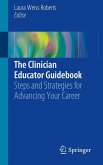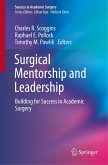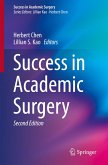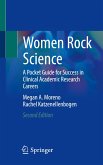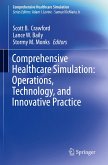A How To Guide For Medical Students
Herausgegeben:Gillis, Andrea; Aarons, Cary B.
A How To Guide For Medical Students
Herausgegeben:Gillis, Andrea; Aarons, Cary B.
- Broschiertes Buch
- Merkliste
- Auf die Merkliste
- Bewerten Bewerten
- Teilen
- Produkt teilen
- Produkterinnerung
- Produkterinnerung
This book will provide a guide for medical students to self-reflect, build a portfolio, and select a career path equipped with the knowledge to make an informed decision that is the best for them.
The editors comprise a diverse spectrum from background, stage of training, type of practice, to career path. This is a timely update taking into account new situations such as the virtual environment for residency applications, the spotlight on residency wellness, and incorporating diversity, equity, and inclusion in our personal and institutional missions.
Andere Kunden interessierten sich auch für
![The Clinician Educator Guidebook The Clinician Educator Guidebook]() The Clinician Educator Guidebook34,99 €
The Clinician Educator Guidebook34,99 €![Surgical Mentorship and Leadership Surgical Mentorship and Leadership]() Surgical Mentorship and Leadership90,99 €
Surgical Mentorship and Leadership90,99 €![Success in Academic Surgery Success in Academic Surgery]() Success in Academic Surgery45,99 €
Success in Academic Surgery45,99 €![Women Rock Science Women Rock Science]() Megan A. MorenoWomen Rock Science29,99 €
Megan A. MorenoWomen Rock Science29,99 €![General Surgery Residency Survival Guide General Surgery Residency Survival Guide]() General Surgery Residency Survival Guide53,99 €
General Surgery Residency Survival Guide53,99 €![The Essential Guide to Healthcare Professional Wellness The Essential Guide to Healthcare Professional Wellness]() The Essential Guide to Healthcare Professional Wellness19,99 €
The Essential Guide to Healthcare Professional Wellness19,99 €![Comprehensive Healthcare Simulation: Operations, Technology, and Innovative Practice Comprehensive Healthcare Simulation: Operations, Technology, and Innovative Practice]() Comprehensive Healthcare Simulation: Operations, Technology, and Innovative Practice75,99 €
Comprehensive Healthcare Simulation: Operations, Technology, and Innovative Practice75,99 €-
-
-
This book will provide a guide for medical students to self-reflect, build a portfolio, and select a career path equipped with the knowledge to make an informed decision that is the best for them.
The editors comprise a diverse spectrum from background, stage of training, type of practice, to career path. This is a timely update taking into account new situations such as the virtual environment for residency applications, the spotlight on residency wellness, and incorporating diversity, equity, and inclusion in our personal and institutional missions.
The editors comprise a diverse spectrum from background, stage of training, type of practice, to career path. This is a timely update taking into account new situations such as the virtual environment for residency applications, the spotlight on residency wellness, and incorporating diversity, equity, and inclusion in our personal and institutional missions.
Produktdetails
- Produktdetails
- Success in Academic Surgery
- Verlag: Springer / Springer International Publishing / Springer, Berlin
- Artikelnr. des Verlages: 978-3-031-66010-8
- 2. Aufl.
- Seitenzahl: 296
- Erscheinungstermin: 5. September 2024
- Englisch
- Abmessung: 235mm x 155mm x 16mm
- Gewicht: 506g
- ISBN-13: 9783031660108
- ISBN-10: 3031660102
- Artikelnr.: 70946645
- Herstellerkennzeichnung
- Springer-Verlag GmbH
- Tiergartenstr. 17
- 69121 Heidelberg
- ProductSafety@springernature.com
- Success in Academic Surgery
- Verlag: Springer / Springer International Publishing / Springer, Berlin
- Artikelnr. des Verlages: 978-3-031-66010-8
- 2. Aufl.
- Seitenzahl: 296
- Erscheinungstermin: 5. September 2024
- Englisch
- Abmessung: 235mm x 155mm x 16mm
- Gewicht: 506g
- ISBN-13: 9783031660108
- ISBN-10: 3031660102
- Artikelnr.: 70946645
- Herstellerkennzeichnung
- Springer-Verlag GmbH
- Tiergartenstr. 17
- 69121 Heidelberg
- ProductSafety@springernature.com
Andrea Gillis is an Assistant Professor in the Division of Breast and Endocrine Surgery at the University of Alabama at Birmingham. After receiving her M.D. from Columbia University and completing surgical residency at Albany Medical Center in New York. She completed endocrine surgery fellowship training at the University of Alabama at Birmingham where she began her career. Her clinical interests include thyroid cancer, benign thyroid disease, hyperparathyroidism, adrenal disease, and surgical treatment of inherited endocrine syndromes. Dr. Gillis is a health outcome disparities and translational science researcher working in the field of epigenetics, specifically examining differences in gene expression in neuroendocrine tumors by race. She is extramurally funded in order to pursue this work. She is also passionate about surgical education and shoring up the pipeline of talented academic surgeons, she serves as the Associate Clerkship Director in this capacity. Cary B. Aarons is a Professor of Surgery at Columbia University Irving Medical Center, where he is also currently the Program Director for the General Surgery Residency. He received his undergraduate degree from Harvard University and his medical degree from Howard University College of Medicine in Washington, DC. He then completed his general surgery training at Boston University Medical Center followed by his colorectal surgery fellowship at the Mayo Clinic in Rochester, Minnesota. Dr. Aarons has held several roles in education leadership and has a record of research scholarship in surgical education.
Part I: Exploring Surgical Specialties and Practice Settings.- Assessing Your Interests, Skills, and Values.- Choosing a Surgery Training Environment: Military Programs.- Independent Programs.- Choosing a Surgical Training Environment: Rural Surgery Programs.- Choosing a Training Program: University-Based Programs.- Overview of the Surgical Subspecialties: Plastic & Reconstructive Surgery.- Overview of the Surgical Subspecialties: Vascular Surgery.- So you want to be a Cardiothoracic Surgeon?.- Maximizing the Clinical Years in Medical School-A Fourth Year Student's Perspective Preparing for Surgical Training.- Part II: Navigating the Residency Application Process.- Developing a Competitive Residency Application.- Navigating the Residency Application Process: Understanding the Updates to the Recruitment Process.- Navigating the Residency Application Process: Preparing for both Virtual and In-Person Residency Interviews.- Navigating the Residency Application Process: A Recent Applicant's Perspective on Choosing a Residency Program.- Part III: Excelling in Surgical Training.- Developing Clinical and Technical Skills.- Utilizing Technology and Simulation-Based Training (Excelling in Surgical Training).- Strategies for Succeeding During Intern Year: Perspectives from Recent Surgical Interns.- Strategies for Succeeding in Residency Programs: A Program Director's Perspective.- Part IV: Building a Career in Academic Surgery.- Balancing Clinical, Research, and Teaching Responsibilities.- Understanding The Intersection of Social Media and Mentorship in Surgery and Medicine.- Part V: Work-Life Integration as an Academic Surgeon.- Fostering Productive Mentor-Mentee Relationships.- Achieving Personal and Professional Fulfilment.- Part VI: Embracing Diversity and Inclusion in Surgery.- The Resident Perspective - A Part of and Apart from the Surgical Workforce.- Recognizing Unconscious Bias and Its Impact on Patient Care and Outcomes.- Strategies for Promoting Diversity and inclusion in Surgical Specialties.- Understanding the Importance of Self Care and Mental Health.
Part I: Exploring Surgical Specialties and Practice Settings.- Assessing Your Interests, Skills, and Values.- Choosing a Surgery Training Environment: Military Programs.- Independent Programs.- Choosing a Surgical Training Environment: Rural Surgery Programs.- Choosing a Training Program: University-Based Programs.- Overview of the Surgical Subspecialties: Plastic & Reconstructive Surgery.- Overview of the Surgical Subspecialties: Vascular Surgery.- So you want to be a Cardiothoracic Surgeon?.- Maximizing the Clinical Years in Medical School-A Fourth Year Student's Perspective Preparing for Surgical Training.- Part II: Navigating the Residency Application Process.- Developing a Competitive Residency Application.- Navigating the Residency Application Process: Understanding the Updates to the Recruitment Process.- Navigating the Residency Application Process: Preparing for both Virtual and In-Person Residency Interviews.- Navigating the Residency Application Process: A Recent Applicant's Perspective on Choosing a Residency Program.- Part III: Excelling in Surgical Training.- Developing Clinical and Technical Skills.- Utilizing Technology and Simulation-Based Training (Excelling in Surgical Training).- Strategies for Succeeding During Intern Year: Perspectives from Recent Surgical Interns.- Strategies for Succeeding in Residency Programs: A Program Director's Perspective.- Part IV: Building a Career in Academic Surgery.- Balancing Clinical, Research, and Teaching Responsibilities.- Understanding The Intersection of Social Media and Mentorship in Surgery and Medicine.- Part V: Work-Life Integration as an Academic Surgeon.- Fostering Productive Mentor-Mentee Relationships.- Achieving Personal and Professional Fulfilment.- Part VI: Embracing Diversity and Inclusion in Surgery.- The Resident Perspective - A Part of and Apart from the Surgical Workforce.- Recognizing Unconscious Bias and Its Impact on Patient Care and Outcomes.- Strategies for Promoting Diversity and inclusion in Surgical Specialties.- Understanding the Importance of Self Care and Mental Health.


